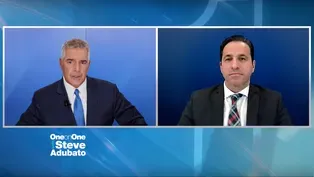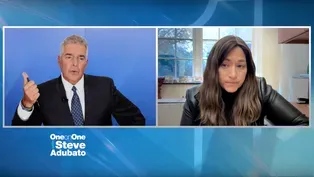One-on-One
How Parents and Students Can Better Understand ADHD
Clip: Season 2024 Episode 2666 | 10m 10sVideo has Closed Captions
How Parents and Students Can Better Understand ADHD
Steve Adubato is joined by Melanie Bieber and Ralph Pacifico, authors of "Aaron Daniel Henry Davis: Just Another Day at School," to address the needs of students living with ADHD and how parents and teachers can better understand the disorder.
Problems with Closed Captions? Closed Captioning Feedback
Problems with Closed Captions? Closed Captioning Feedback
One-on-One is a local public television program presented by NJ PBS
One-on-One
How Parents and Students Can Better Understand ADHD
Clip: Season 2024 Episode 2666 | 10m 10sVideo has Closed Captions
Steve Adubato is joined by Melanie Bieber and Ralph Pacifico, authors of "Aaron Daniel Henry Davis: Just Another Day at School," to address the needs of students living with ADHD and how parents and teachers can better understand the disorder.
Problems with Closed Captions? Closed Captioning Feedback
How to Watch One-on-One
One-on-One is available to stream on pbs.org and the free PBS App, available on iPhone, Apple TV, Android TV, Android smartphones, Amazon Fire TV, Amazon Fire Tablet, Roku, Samsung Smart TV, and Vizio.
Providing Support for PBS.org
Learn Moreabout PBS online sponsorship(upbeat music) - We're now joined by Melanie Bieber, who's a mental health professional, and her colleague Ralph Pacifico.
He is a phys ed teacher at MKA Varsity Montclair Kimberley Academy.
They're the authors of "Aaron Daniel Henry Davis: Just Another Day at School."
Welcome folks.
- Thanks so much- - Welcome, Steve.
Thanks for having us.
- The essence of this book is about young people, students who deal with and suffer from ADHD.
What is it and what is the message in the book?
- Absolutely, so ADHD, attention deficit hyperactivity disorder, is a different way that the brain works.
And it can impact the way that a child or an adult addresses every aspect of their daily living.
And this book's mission is to help de-stigmatize so that children who have ADHD see themselves in a positive light, and those who don't better understand and don't judge children who do.
- Hmm, Ralph, you and Melanie working together on this book for a long time.
You and I are actually talking about this the other day.
Let me disclose, Ralph and I are golfing partners.
He beats me on a regular basis, but I just wanna get that out there.
Ralph, how about this?
This is personal for you as well as a professional endeavor.
Talk about the personal aspect for you.
- That's correct, Steve.
Well, when I was younger, there wasn't an ADHD label.
It was hyperactivity, and people just didn't understand, you know, the energy factor.
I would be in a classroom and hear a firetruck go by the school, and I would run to the window and knock people over to get to the window to see the firetruck.
So for me, it's a personal venture.
And Melanie understands that.
And I saw her working with the kids at our school and fell in love with her work ethic and what she did, so.
- You know what's interesting here, actually, in reading the book, there was actually a scene where Aaron Daniel Henry Davis is looking out in the classrooms, looking at the firetruck chaos in the room.
But you know what struck me at this?
And I'm gonna the back of the book, there are several, their activities, p.s., go on the website to find out more of their activities and things that we should know to be helpful to those students who are dealing with ADHD.
You know, what struck me is Mr. Nelson, the teacher in this class.
Melanie, talk to me about Mr. Nelson, the teacher who has particular sensitivity to Aaron, please.
- Yes, so Mr. Nelson is that teacher that every child dreams of having, the teacher who really understands who this child is, what makes them tick, and how to bring out the absolute best in them.
And when children who struggle have a Mr. Nelson in their life, they begin to thrive.
They begin to see themselves for the amazing, wonderful child that they truly are.
- Ralph, did you have that?
- Without a doubt.
I think it's the most important thing in anybody who's classified with ADHD is to have a teacher that understands them.
There's- - I'm sorry for interrupting, Ralph, did you have a Mr. Nelson?
- I did, Mrs. Evans, Jean Evans at Pleasantdale School, which now is Kelly Elementary in West Orange.
- And what did she do for you?
- It's a great question.
One of the strategies she used was letting me, when she would tip her nose, I would be able to leave the classroom and walk around and walk it off, like walk off my energy and get back.
And the walk seemed like I was gone for seven minutes, but it was more like a minute and a half, and I was ready to refocus when I returned back to class.
- It is awesome, and the strategies here.
I'm gonna go through a few of them.
Melanie, you and Ralph jump in back and forth.
Let me do this, before I do strategies, I'm gonna talk about some of the, ah, symptoms of ADHD: squirming and fidgeting a lot, difficulty staying seated, running and climbing at inappropriate times, difficulty playing or working quietly, blurting out answers, difficulty waiting and taking turns, making careless mistakes, et cetera, et cetera.
But strategies, that's where I wanna focus, Melanie.
Could you give us one strategy?
I know there are many more, that's why you should go on the website to find out more.
One strategy that will help teachers and parents who are dealing with and trying to be helpful to younger people with ADHD, please, Melanie?
- Absolutely, so one great strategy for teachers and parents is about routine.
Routine is one of the hardest things for children who struggle to organize their executive functioning.
Creating a visual for a child with ADHD of their routine with them in the pictures.
Step one, picture of Aaron getting dressed in the morning.
Step two, picture of Aaron brushing his teeth in the morning, so on and so forth.
Taking him through the morning routine, taking him through the transition in the morning in his classroom space, any routine throughout the day, creating that visual with a couple of words underneath it to describe exactly what we're talking about, that can help teachers and parents help their children tremendously.
- So interesting.
Ralph, I'm curious about this.
As a phys ed teacher, do you know, (clears throat) excuse me, do you know that a student is dealing with ADHD?
Are you told, do you have to pick it up, how does that work?
A, and B, how has this experience helped you be a better educator in the phys ed department?
- Steve, I think that the most important part of my job is to captivate, especially children with ADHD.
You have to keep them interested in the content.
That would probably mean, in a 30-minute phys ed class, doing five or six different activities for three to four minutes instead of doing something for 30 minutes that has a yawn effect on them and doesn't captivate them.
But I think that Melanie put out a good point, but the most important part of education in ADHD students is captivation, captivating the student and making them want to listen, making them want to be aware of what's going on in the class.
So you have to be a little bit dynamic.
- Stay on this, Melanie.
Ralph raised a great point.
In my other life as a communication coach and seminar leader around leadership and communication, I use the word engage.
Mary Gamba, my colleague doesn't like that.
I call it forcefully engaged.
What I mean by that is assertively engage people, because I won't get on my soapbox, but whether someone has ADHD or not, hearing a lecture doesn't work, and it's boring.
Never works.
- Yup.
- Engaging students versus lecturing, how the heck do you teach teachers to engage and not lecture?
Please, Melanie.
- So one of the best ways to do that is for teachers to learn about multi-sensory approaches to education.
What that means is, I know you're giving me that look, like, "I don't know that phrase," right?
- You've engaged me.
(chuckles) What does that mean?
- It means that we don't just learn by listening.
We learn by doing.
We learn by touching.
We learn by seeing.
We learn by hearing.
And the more of the senses that we can combine when we're teaching something new, the more dynamic we can make the learning, the more engaging it becomes.
When you're not just listening, but you're physically moving your body and you're reading and you're hearing and you're touching, all of the sudden your brain is activated in a completely different way.
And it makes the information what we call sticky.
- I love it.
Hey, real quick before I let you go.
Ralph, the hopes for this book are, moving forward?
- Just to create awareness and provide some knowledge to people, you know, dealing with children with ADHD.
- Melanie, any reason why this book should not be in the hands of teachers, educators, parents, and others, because there are so many?
I didn't do this.
Do we have any sense of how many young people are dealing with ADHD?
I'm sorry, Melanie, go ahead.
- You know, I don't have that number off the top of my head, but I can tell you that almost every classroom in America has at least one kiddo who either has or should be diagnosed with ADHD, even if they haven't been yet.
And so the reality is, it's around us everywhere we go.
And every child can benefit, because this isn't just a book for children who have ADHD, but also for children to learn about it.
- To Melanie, to Ralph, I cannot thank you enough for joining us.
It's such an important topic, and you helped educate all of us, thanks so much.
- Thank you.
- Thank you, Steve.
- Stay with us, we'll be right back.
- [Narrator] One-On-One with Steve Adubato has been a production of the Caucus Educational Corporation.
Funding has been provided by The Healthcare Foundation of New Jersey.
New Jersey Sharing Network.
Robert Wood Johnson Foundation.
The New Jersey Education Association.
Johnson & Johnson.
The North Ward Center.
The Port Authority of New York and New Jersey.
PSC.
And by New Jersey’s Clean Energy program.
Promotional support provided by NJ.Com.
And by BestofNJ.com.
- (Narrator) New Jersey is home to the best public schools in the nation, and that didn't happen by accident.
It's the result of parents, educators and communities working together year after year to give our students a world class education.
No matter the challenge, because parents and educators know that with a shared commitment to our public schools, our children can learn, grow and thrive.
And together, we can keep New Jersey's public schools the best in the nation.
Ongoing Staffing Shortages in the Medical Field
Video has Closed Captions
Ongoing Staffing Shortages in the Medical Field (6m 4s)
Trauma Inflicted Upon Families During COVID
Video has Closed Captions
Trauma Inflicted Upon Families During COVID (10m 45s)
Providing Support for PBS.org
Learn Moreabout PBS online sponsorshipSupport for PBS provided by:
One-on-One is a local public television program presented by NJ PBS













